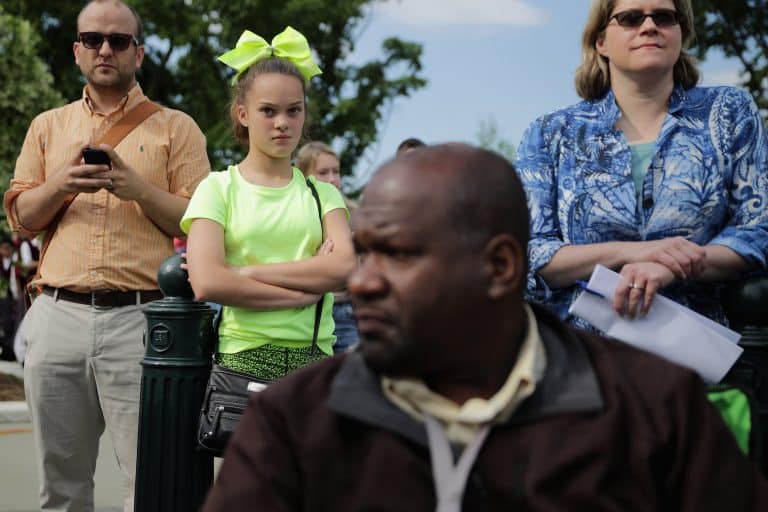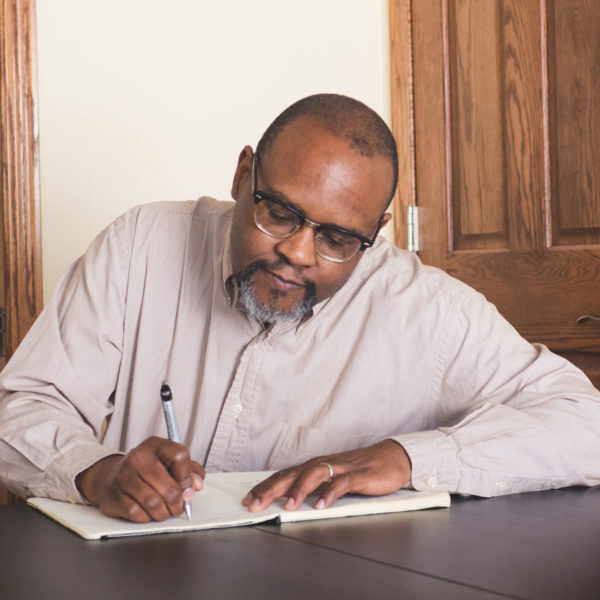
Image by Chip Somodevilla/Getty Images, © All Rights Reserved.
On Echo Chambers and Everyday Americans
In the contentious, post-inauguration whirlwind that has engulfed this country, I’ve continued to hear commentators (even some who disagree with our new president) asking those of us critical of Trump voters to “exit our echo chambers.” These analysts hold us partially responsible because, they say, we failed to attend to that part of the electorate’s fear and pain.
Their claim made me reflect on the subject I once studied and taught: rhetoric — our use of language to come to terms with our differences. I thought again about the intersections of arguments and audiences, of what gets told, who gets talked to and about, and why. And I recognized in myself an unaddressed “we” excluded from the discussion.
I’ll explain it this way:
Every broken family has three stories: the one it tells to the world, the one it shares among family members, and the real story.
You can map the health or dysfunction of any family by the distance of those stories from one another. The first two stories have their audience and purpose. The family tells the first story to establish prestige; it tells the second story to create cohesiveness and a positive sense of its own identity. But these first two stories have another purpose: to protect the more valued family members from criticism or shame, even if it means sacrificing other less valued members.
In a broken family, the third story has no natural audience. In that family, no one wants to hear the third story because it reveals the family’s brokenness. By threatening the standing of more valued members, by calling their actions into question, it threatens the family’s false image of itself.
And in such a family, brokenness is the secret to be kept at all cost.
Because of this, you can recognize a third story in two ways. First, it won’t be pretty and covered in glory. Third stories dredge up the family’s history of ugliness, incidents that other family members believe are best forgotten. In third stories, the family’s brokenness is not an aberration, not an accident, not the temporary mistaken view of one or two bad actors. In a third story, brokenness lives at the center of the family narrative, right alongside the goodness and promise.
This means you can also recognize a third story by how forcefully the family rejects it. Some will become angry; some will call the teller misguided or insane or evil. One way or another, family members will do all they can to burnish the family’s achievements and silence the family’s flaws.
“Clinton would go out of her way to appeal to minorities, immigrants. But she didn’t really for everyday Americans.”
— Shannon Goodin, Trump supporter from Owosso, Michigan
Purveyors of the echo chamber argument contend that so many Americans can’t possibly be motivated by racism, misogyny, or other forms of bigotry. They are valued members of our national family; they’re hard-working, ordinary citizens. But we who speak from marginal positions in the family have some third story experiences to tell.
The children of Everyday Americans were my white, working- and middle-class high school classmates who felt free to use racial, gender, and homophobic slurs because they believed — quite rightly — that none of their peers would challenge them. They grew to become educated, intelligent children of Everyday Americans who did the same when I was in college; the students who liked to “joke” that my brown skin earned me coveted internships rather than my hard work.
Everyday Americans were some of my academic colleagues who made excuses about the lack of “suitable” non-white candidates for faculty jobs while they did little or nothing to find those candidates; the academics I worked with at colleges with dwindling enrollment who resisted recruiting students of color because it might mean “lowering standards” because such students wouldn’t be “college material.”
Everyday Americans (many who self-identified as liberal) included those who, during the crack cocaine and AIDS epidemics that ravaged marginalized communities, responded not with compassion but with condemnation and judgment, talking about how “those people brought it on themselves.”
They didn’t burn crosses or wear white robes. They simply traded in a persistent, casual denigration of the humanity of anyone who didn’t look or dress or pray or love or talk as the Everyday Americans these people perceived themselves to be. These are the Everyday Americans I came to know, living in Arizona, Iowa, Kansas, Missouri, North Carolina.
These aren’t the stories of Everyday Americans that the advocates of exiting our echo chambers want to hear. The ongoing abuse of marginalized Americans — through good times and bad, across social classes, educational levels, and centuries right up to the present — doesn’t fit the narrative of essentially good people in uniquely hard economic times who have suddenly taken a wrong turn.
No family can completely erase the third story — whether or not it’s told — because it represents reality. Everyone in the family will bear some trace of the story. Most drive that trace from their consciousness; some feel its tug from time to time, but generally keep it at bay.
But every broken family will have some who can’t escape the burden of the third story because we’re the ones crushed by it. The other family members will feel the threat in some visceral way and try to suppress us and the story we have to tell. Not infrequently, they succeed. They manage this by denigrating, undermining, and shaming us. And they use language familiar to anyone who’s been abused and had that abuse minimized:
“It was a mistake. That’s not what he’s really like.”
“She’s a good person deep down.”
“She’s had a hard life.”
“He’s had a hard day/week/month/year.”
“He didn’t mean to hurt you. He’s trying to do better.”
“She’s under a lot of stress.”
“Stop making it about you. Think about the rest of the family.”
“You’re just making things worse.”
“Maybe you’re the problem.”
“Maybe if you didn’t complain so much, he would do better.”
“Maybe if you learned to let it go, she wouldn’t act that way.”
“It wasn’t that bad.”
“Have some compassion. Show some understanding. Be the bigger person. Be forgiving.”
“Move on.”
“Stop holding on to your pain and look at it from his point of view.”
“They’re not really racist.”
“They just don’t understand.”
“Stop dwelling on the harm they’re doing to you and empathize.”
Through this flurry of words, the message emerges: Preserving a pristine story of the family matters more than holding people accountable for their actions. Matters more than justice. Matters more than truth. Matters more than our well being. Matters more than us.
Real dialogue depends on a reciprocal respect that we who are marginalized have never received. And I know you know what I mean:
- Everyday Americans say that despite hard work, they’re denied opportunities because of poverty, and we believe them. When we tell them that, despite hard work, we’re denied opportunities because of race, gender, sexual orientation, religion or physical ability, do they believe us?
- Everyday Americans tell us they are Christians, and we accept them. When we practice Islam or other religions, or are agnostic or atheist, do they accept us?
- Everyday Americans say job loss, despair, poor health care, and poor treatment options fuel devastating drug use in their communities, and we believe them. When we say this same combination plus racism drive drug use that has devastated inner cities for decades, do they believe us?
- Everyday Americans say they need better education and investment in their communities to make them prosper, and we believe them. When we say communities of color across the U.S. also need improved education and investment, do they believe us?
- Everyday Americans say they need and deserve a stronger social safety net, and we believe them. When we tell them that marginalized communities need and deserve a stronger social safety net, do they believe us?
Those of us who bear and know and live that third story, the story of brokenness that lives beside the beauty, have to tell it. And tell it again. And keep telling it. Not to save our national family, though it does offer that possibility. Not to “win” or “be right.” Not even just because it’s true. We have to keep telling it because that’s the only way we can keep our sanity.
The alternative is to remain in this nation’s overarching echo chamber with those who continue to deny the depth and pervasiveness of our experiences and, along with that, our humanity. The cry to exit our echo chambers suggests a past where we all used to listen to one another. But we marginalized know that’s a myth that Everyday Americans tell themselves. We know because we’ve spent centuries in this country fighting for a place in the conversation.
We’re still fighting for it. We’re still trying to tell that third story, and still being told to be quiet and listen. We’re waiting for the day when America decides to exit its echo chamber, its half-told story. Waiting where we’ve always been.
Outside.
